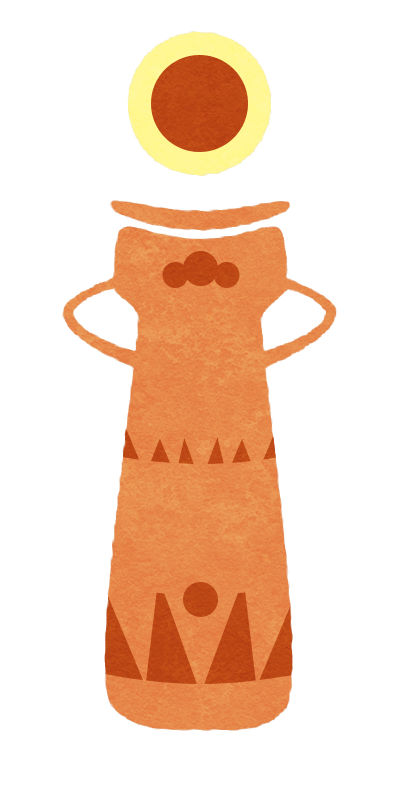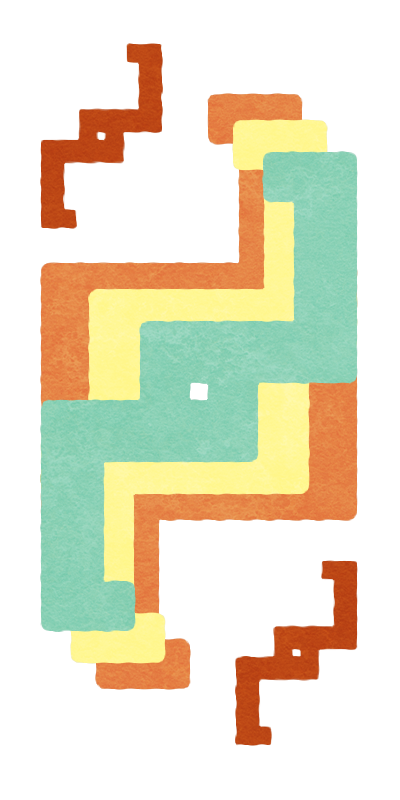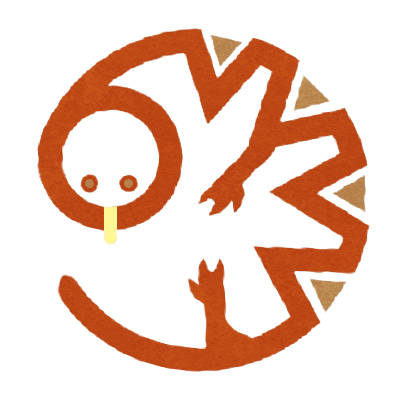I was nervous about leaving home— but as I climbed to the outskirts, and looked back on the capital? I realized something. I used to think everything pointed towards the center, the castle. In reality, they pointed outwards— urging me to go on my way.Rektouzk is one of Qet's largest nations, and with trade routes throughout, their influence has spread well into the known world. The Coulqepluex— an often cold, shrewd people— make up the majority of the population. Trade is the driving force of the nation, if one needs to find something— they likely can within Rektouzk's markets.
Uncanny Luck
Amassing wealth
Over the centuries, Rektouzk grew to become what is arguably the world's wealthiest nation. With trade routes creeping like vines through the world, and their ships snaking along the seas to touch almost every known shore, there is almost nothing Rektouzk cannot procure. Several have tried, and failed, to take this astounding wealth for themselves. The now conquered nation of Ytoxi launched a series of battles against the fledgling Rektouzk a hundred years or so past its foundation. After a number of assaults on Rektouzk settlements— largely failures, save for a few razed villages— the Ytoxi made one final, desperate, attack. While successful in destroying a Rektouzk city along their border, they returned home to find their palace— and capital alongside it— burning. Some freak accident must have occurred, as none of the few survivors could recall what started it. Rektouzk sent an army to conquer the now weakened and leaderless nation as vengeance soon after the failed attack.My eyes beheld terrible flames which licked the sky as the city crumbled in their lurid glow. The thrill and pride of our success was burned away with my home, and replaced with a terror deep in my gut— were we being punished from on high?
Governing Structure
Architecture
Assets, Industry, and Trade
Gold from stone
Rektouzk, luckily, seems to sit upon a massive deposit of gold and a gleaming, purple gem unique to this area called couleuz. A uniquely large mining operation is carried out underneath the capital itself; within Tchaoxlik there lies a large sub-cavern known as Chluetichlon Polt, with what seems to be a natural spring, and lakes, within. Entire settlements have been constructed within the depths to house miners— so that they may never have the need to leave.Profitable agriculture
Fields of maize provide the core of the Rektouzk diet, other grains, fruits, and vegetables are grown in their vast farmlands, and imported from elsewhere. Specialties, such as the yoult tree— a drug of choice throughout the known world— are grown in large areas to be collected and sold, as well.Mercenary armies
An impressively large army— perhaps the largest on the continent— has enabled Rektouzk borders to spread throughout much of Rqet. They maintain two military fortresses in both the north and south, and command a large navy. Rektouzk forces can differ— as with their wealth they hire various for-profit mercenaries. Typically, the more wealthy the group— or the better paid— the better their equipment. The best of the best don well-polished, embellished, bronze cuirasses. These go over the head and fasten at the shoulder with thinner metal sheets fastened over buttons on the front with their symbol— typically an animal or monster of sorts— prominently and proudly sitting high off the center. Bronze helmets are fashioned in a number of different styles; some cover the face with small holes for the eyes and a small knob on the top, others only go halfway down the face with a middle piece extending to protect the nose— this style typically has two extended ridges on top in an angled cross shape, were you to look at it from above. Some simply cover the very top of the head, often with leather pteruges studded with smaller bronze plates extending from the bottom. Many of the more accomplished crews like to add flavor to their armor to flaunt their status. These are completed with bronze greaves which cover the lower legs.Smaller, inexpensive groups don leather armor fashioned similarly, but much more simply. Many won't have the money to dye on their symbols, but some do. Their greaves typically only cover their shins.
Mid-range mercenaries use iron gear, well-enough fitted, and strengthened. Some may emboss their symbols into their gear, many are content with paints— despite it being liable to wear.
Religon
Education
Polt ic Ztyec
Rehk-too-zihk
Founding Date
20/6/2793
Type
Geopolitical, Country
Capital
Alternative Names
Trademasters
Demonym
Rektouzkeu
Leader
Head of State
Government System
Meritocracy
Power Structure
Unitary state
Economic System
Market economy
Currency
Coulhuel are 1 1/2 x 1 1/2 inch gold coins, oddly punched into the form of a single, large circle, with two smaller circles on the left and top. Within these small circles are engraved strange, unrecognizable, symbols which— by some, strange accounts— have been said to sing softly in the dark. On the front, center, is the crest of the nation, and on the back, a depiction of water.
Major Exports
Tin, gold, gems, pottery, weapons, furniture.
Major Imports
Copper, silver, salt, grapes, and the ever-popular Yntxol fruit— and anything else that may be profitable.
Official Languages
Controlled Territories
Related Ethnicities
An unprepared leader
The seat of power has shifted after the up-and-coming Tichcoul Atozolklio died suddenly— leaving his wealth to his son, Lohtzin Atozolklio. Technically, having amassed the most wealth and therefore being the most successful— Lohtzin became the next Tichoul, instead. The young man, it is believed by a growing camp of citizens, is greatly unqualified for the position. Almost immediately the man sought to go to war with Romtol in the north— which would not only disrupt trade with the nation itself, but the Gokh, and Louh as well. He was a disgrace to his father before his death— having sunk numerous trade ventures and deals entrusted to him by his father. It had been years since the pair were last seen together. Rumors had spread about him being disowned, even. How was it that Lohtzin still received the man's inheritance?My father was a trustworthy trader— many of you knew this well. How could I not be the same if his blood flows through my veins?Despite the strange circumstances surrounding his father's death, and his potential endangerment of their safety— a surprising number of Rektouzkeu support him. Outwardly he has spun his actions as attempts to remove "unsavories" from the nation— namely the Tollouchi who live among them. Tensions between the various ethnic groups living within Rektouzk are only getting worse, as rights are removed and race-related violence continues to increase. Many fear for their futures.








First of all, I am really interested in the world you are building. The themes and sources your draw on are wonderfully different from the typical medieval-fantasy stuff. The CSS, background and images really help spark the imagination - ziggurats in the sun, fields of maize and Chinampas. I'm not at all an expert on those cultures, though! So if I make some generalization or mistake which cultures you are drawing from, I apologize in advance. Something to add to the Inspiration article, maybe? :D The article itself is pretty good, but it leaves me with a few questions and some notes. I'll be doing the main panel first and the side panel after that. :) First, some general notes: I would suggest you begin the article with a sort of overview of what the article is about, after the quote but before "Purple Capital". Because that's the first header, I initially thought that the article was about the settlement and the fact didn't become clear until the second paragraph of governance. Secondly, I did a search for — and counted 60. That feels like a lot and reading the article, they become sort of problematic. The quote alone has 4.
I'm not quite sure what this quote is trying to tell me or what it is trying to impart. Or why a trader would be reluctant to leave home - it's sort of the source of this place's power, isn't it? This start could work, but the way the rest of it is written makes things a little unclear. Who are the Coulqepluex? Are they one of the three? Why is diplomacy unthinkable? What *made* it unthinkable? "Changing the tides" suggest things were going one way, rather than perpetual. I would have expected something like broke the stalemate or something. You also have two em-dashes in there, which makes it kind of weird to read. Maybe I'm not used to seeing them used this much, but it feels like a lot. This feels like a bit of an origin story, but I can't comment too much on its placement right now. It could work with an overview paragraph or two above it. Without it, I'd place it much further down. "Bribing them" - bribing who? This is when it becomes unclear who the Coulqepleux are or who they are interacting with. Also, how is the gold strangely shaped? This place seem to have a theme of random disasters befalling their enemies: I'm surprised it isn't more integrated into their society or religion. At 30 words, this sentence might be a little long. It also feels a little sudden to jump from bribery and diplomacy to what sounds like the final charge of a climactic battle. It makes it a little difficult to follow the timeline of events: what happened after the alliance? Did they immediately gather up and charge? I'd split it up and maybe expand on some individual bits. Give a bit dramatic flair to the storm, to people's reactions to it, and the build up to the end of the war. Who is "their leader"? It's also unclear who "those who remained" are - is it everyone in the tribe or the army they fought? In fact, where did the last battle and disaster take place? Also... Where did they pick the name from? :) I like the evocative description here, but the sentence is 30 words long so it might be worth shortening it a little. "Their trade routes creep and ships snake along..." and let the "there is almost nothing" as its own sentence. Also, I noticed you're writing it all as a kind of past tense. Are they no longer in the setting? "The now assimilated" threw me off occasionally. I assumed it means, they were once their own thing and was conquered by the Rekt, which was correct. Another sudden jump into the last of the action: why were these actors at war? Why were they failing? What narrative purpose does it serve, because it doesn't seem like the Rekt were in any real danger or anything... But the ending also is a little unsatisfying without some more details or foreshadowing. More on that in a bit. The first sentence is a bit long at 28 words. You could easily cut the "- and capital alongside it -" and change "palace" for "capital". Other than that, this is the second time they're essentially served up victory by freak circumstance. I assume this is a decision, but it may be good to expand upon it in some manner. Also, "some freak accident" is kind of vague.. Was there no survivors that could tell what happened? You mentioned burning to ash, so fire was involved.. But it's a bit vague on details. With this kind of luck, I'd assume the Rekt would have worked it into their storytelling more. Kinda like the Japanese with Banzai wrecking the mongol invasion fleets. President feels like a very modern world, so it feels a bit out of place while also not adding much detail. Most will probably think of a president as in of the united states, which carries a lot of baggage with it. The "ultimately" adds a bit of a stumble with the double commas. I'd either rewriting it ("What constitutes success is ultimately decided by the head council. It is notoriously corrupt, susceptible to...") or cutting it. Maybe consider cutting "simply", to continue the war on -ly's. :) I'd cut the ", too," to make it read a little more smooth. Who makes that call? Who counts wealth and assigns stewardship? Is it the council, or agents appointed by them? Is there an incredibly powerful IRS in this nation? Another - that doesn't really need to be there. The however could also be cut. Aside from that, the concept could do with some fleshing out. The idea of guards being like a centrally trained force that's then mercenaried out is intriguing and I would love to know more. Are guards different from the military? What hoops does one hop through to start their kid/adult son as a guard? Is it prestigious, or seen as a "couldn't make it as a merchant" second-tier profession? Another em-dash that doesn't really need to be there. You could nuke the ", typically," without losing anything. I would consider restructuring this part a bit. So they build down - tell us more about that in broad strokes before digging into details. :) Does it mean they physically dig down and excavate large parts of soil to build houses downwards? Do they dig tunnels and expand those into rooms and passages? What does that kind of city smell like, or feel like? Is it claustrophobic? :D You repeat "often" in this sentence, it would probably read nicer if you changed one of them to something else. :) Another em-dash.. I will stop pointing them out now, unless you want me not to. :D But it's something to keep an eye out But, I've run out of time and need to go! I hope you find that useful. If so, I can continue later! And again, you have an awesome setting here. I think you have a wonderful core to build on and I look forward to reading (and commenting!) on more of it. :)Creator of Araea, Megacorpolis, and many others.
Thanks! Lots of good criticism I can act on here!
Here, it is used purposefully to create a pause— suspense— despite it being a somewhat low-stakes subject. It gives a short moment for the reader to consider the question of what happens to an area that cannot afford guards for a brief moment— which can lend some more weight to it. Here, however— you are absolutely right. While the em-dash *can* replace a comma, it creates a longer pause which I agree does not belong there.I thought of writing an overview but I don't remember *why* I chose not to— but yeah I definitely need to make it clear early on that what, exactly, Rektouzk is.
I've got a few things to clear up, glad you've pointed those out.
I will say that there is a fair bit of subjectivity for writing style. Sentence length (to an extent) and dash usage are split cases without clear rules.
I do agree that I should cut down a bit on em-dash usage, but for example;
I'll definitely need to be more mindful of how I use it, thanks for getting me thinking about that!
Forgot to mention— I will write about how their luck affects their culture and beliefs in their ethnicity page— I'm keeping Country articles focused on how the nations operate at a wider level— ethnicities and religions will go into those more.
Ultimately, you are the master of your writing style. I can certainly stop pointing out the em-dashes places, if you feel that style of writing is your voice. 60 just seemed like a *lot*. :D I agree that it's perfectly serviceable in places, for what it's worth! There were places where I did not point it out. :) I'm looking forward to seeing more!
Creator of Araea, Megacorpolis, and many others.